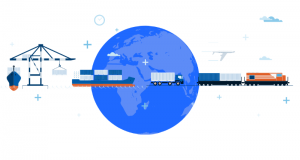
Eximchain has raised $20 million from strategic investors to support blockchain-based enterprise supply chain applications. Founded at MIT media lab in 2015, Eximchain says its mission relates to blockchain infrastructure supporting supply chains. Its target is to address what it claims are the $5.2 trillion lost in revenue each year due to the lack of transparency, connectivity and agility in the global supply chain industry.
“After experimenting (with) POCs on Ethereum or private blockchains, the enterprise world is looking for technical solutions that can be deployed immediately to solve real supply chain problems”, said Hope Liu, Co-Founder and CEO of Eximchain, “There is a huge potential for blockchain technology to revolutionize supply chain processes, and we are all excited to see the progress that Eximchain will help bring to this industry. The successful funding round we have achieved shows the viability and importance of such a project.”
The approach

Eximchain is developing a blockchain which will combine privacy, accessibility and security – from supplier credit to inventory management. Eximchain is looking to leverage blockchain technology in order that stakeholders within any given supply chain can connect, transact and share information more efficiently and securely.
Eximchain’s public blockchain will use private smart contracts so transaction data and trade secrets are encrypted, secure, and remain secret from competitors. The platform will enable businesses and enterprises to integrate its solutions into their existing business processes and applications.
Eximchain blockchain support
The company will offer a variety of supply chain solutions on its blockchain:
- Sourcing – Smart Contracts will record historical data and transactions allowing suppliers to prove their reliability to buyers and rating institutions.
- Supply chain finance – Smart Contracts will allow financiers to verify the validity of orders placed with all upstream partners and suppliers and provide the necessary financing
- Inventory management – tools will enable stakeholders to seamlessly track demand and inventory information across a common ledger.
In addition, the Eximchain SDK will enable companies to build customized, end-to-end, supply chain applications which have data privacy as a core attribute.
Eximchain and raising interest
Eximchain has chosen to go through the ‘airdrop process’ (this replaces the a token generation event). The airdrop program:
- rewards early community members
- addresses the risk and longevity of the project
- leverages the Eximchain network.
Investors include FBG Capitial, Hashed, INBlockchain, Alphabit, Signum Capita, Kinetic Capital,GBIC, 1kx and Connect Capital. Eximchain is also developing partnerships through the fundraising process with business owners interested in developing real world use cases on the Eximchain platform.
“Supply Chain management is all about efficiency and getting insights from data. What Eximchain brings to the table, utilizing blockchain technology, will not only increase the efficiency but most importantly, enable global firms in industries such as Retail and manufacturing affected by the current economic climate to have a clearer insight, reduce costs and make better informed decisions” – said by one of the strategic investors, John Ng Pangilinan, Partner at Signum Capital.
What does this mean
Current blockchain technology does not meet the supply chain industry’s needs, including public transaction data, uncertain network security, and advanced IT knowledge of the system configuration. Eximchain’s aim is to streamline supply chain processes by:
- Reducing barriers.
- Increasing coordination.
- Instilling trust in cross-border transactions.
In this Eximchain is not alone (see other examples like IBM, BlockEx/OpenText or BASF). Improving ‘supply chain processing’ via use of blockchain technology continues to attract interest. A curiosity, however, is how little the potential seems to interest traditional ERP vendors who sell the software platforms which provide the back end processing to the participants in supply chains.

























